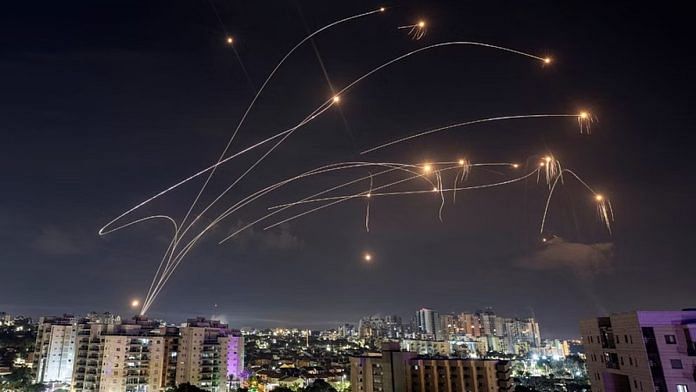October 7 will forever be etched as the darkest day in Israel’s history. Hundreds of murderous Hamas terrorists meticulously infiltrated the country, orchestrating a combined attack against civilians by launching a barrage of rockets at the southern and central regions. These terrorists deliberately targeted women, the elderly, and children, mercilessly killing them in their homes, perpetrating unspeakable acts against girls, and kidnapping many to Gaza.
The situation gradually unravelled, unveiling the horrific aftermath of this brutal assault—at least 1,200 casualties, over 2,700 injured and an indeterminate number held hostage. This savage attack caught Israel off guard, underscoring a significant failure in the country’s intelligence agency and the collapse of the entire security framework.
Fifty years ago, Israel found itself in a similar situation—the 1973 Yom Kippur War due to intelligence and decision-making lapses. However, the resemblance ends there. A more fitting comparison lies with the 9/11 attack in New York, US, as it was a deliberate act of terror against civilians. Consequently, it necessitates decisive action against Hamas and its patrons, Iran and Qatar.
All-round support
It is imperative to emphasise that the current situation is not another cycle of violence as seen in the past. Hamas’ invasion of Israel is a declaration of war. The unequivocal international support for Israel reflects the understanding that something has changed. Jerusalem’s struggle against Hamas now embodies a broader context—a battle for life against those who sanctify death.
US President Joe Biden made his support very clear in several separate statements mentioning “The US stands with Israel” and that “Israel has the right to defend itself and its people.” In addition, Biden sent a message for other hostile parties not to exploit the situation to seek advantage against Israel, “the world is watching.” US Secretary of State Antony Blinken added, “This is the worst attack on Israel since the 1973 war.”
Many other countries expressed their strong support as well, including Europe, Japan, and India. The UK’s Foreign Secretary, James Cleverly, said, “Hamas are not “fighters”, Hamas are not “militants”, Hamas are terrorists.” India’s Prime Minister Narendra Modi shared his solidarity with Israel, and many Indian Hindus expressed similar support, including offers to come to Israel and fight by our side.
In both the UK and India, such as in other countries, Hamas receives support for their actions from radical Muslim groups. They will probably fuel campaigns against Israel’s right to defend itself but the international community should not let this crack the solid diplomatic support for Israel.
This across-the-board support is valuable in providing Israel with the necessary time to plan and execute the reaction to Hamas’ barbaric attacks. Having said that, the window of opportunity for action will close over time. So, Israel should not waste it.
Hesitant Israel
The statements emanating from the Israeli government thus far fail to mirror the gravity of the situation and the imperative for a paradigm shift. The main objective—as presented by Israeli Prime Minister Benjamin Netanyahu, army chiefs and others—focuses on decimating the military arm of Hamas and stripping it of any military capabilities. Regrettably, there is little discourse regarding the total annihilation of this Da’esh-like terror organisation. While the Israeli government has vowed a powerful response, it appears that the same playbook used in past operations in Gaza is being followed, notwithstanding the altered reality, that Israel is at war.
There are two main explanations for this hesitancy. One, the safety of Israeli hostages in Gaza—Hamas denied reports on negotiations and the possibility of humanitarian gestures. Second, the effort to prevent a multi-front war—Hamas in Gaza, Hezbollah in the north, and potential terror attacks in Judea and Samaria. Hezbollah already shot mortars into Israel, which were answered immediately by Israeli artillery.
But it must not stop Israel from acting now. Primarily, the Israeli government must define clear objectives for this situation, realising that merely dismantling Hamas’ military capabilities will fall short. Israel has no alternative but to launch a substantial operation into Gaza, methodically clearing every Hamas-occupied house of terrorists and weapons.
Simultaneously, Israel must identify Hamas’ assets outside Gaza and disrupt money transfer channels as bargaining chips. A combination of direct decisive action against Hamas in Gaza and its leadership abroad will yield enough leverage to increase the chance of freeing the Israeli hostages.
Internationally, the Israeli government needs to focus on three main directions:
- Maintain international support and legitimacy for its battle against Hamas, primarily through close cooperation with the US and dialogues with countries grappling with similar problems of Islamic radicalisation, such as the UK, India, Greece, and others.
- Exert pressure on the international community to work towards the release of hostages, especially countries with their nationals among the captives in Gaza.
- Denounce any attempt to compare Israel and Hamas. Emphasise the barbaric nature of Hamas, and its war crimes, underscoring not only their deliberate targeting of civilians but also their use of Palestinian civilians in Gaza as human shields. Israel must make it clear that the fight against Hamas is not directed at Palestinians; on the contrary, it is for their benefit. Ultimately, the demise of Hamas will serve the Palestinians’ interests and align with the interests of other nations with stakes in the region, seeking stability and prosperity.
The endgame and the various scenarios concerning Gaza’s future can be deliberated subsequently. The spectrum may encompass the restoration of a Palestinian government in Gaza to annexation until firm security is reinstated. Regardless, it must exclude Hamas as the reigning organisation of the Gaza Strip moving forward.
Joseph Rozen is an expert in International Relations, Asian affairs, and National Security. He was the director for APAC and Euro-Asia affairs at the Israeli National Security Council. Views are personal.
(Edited by Ratan Priya)



